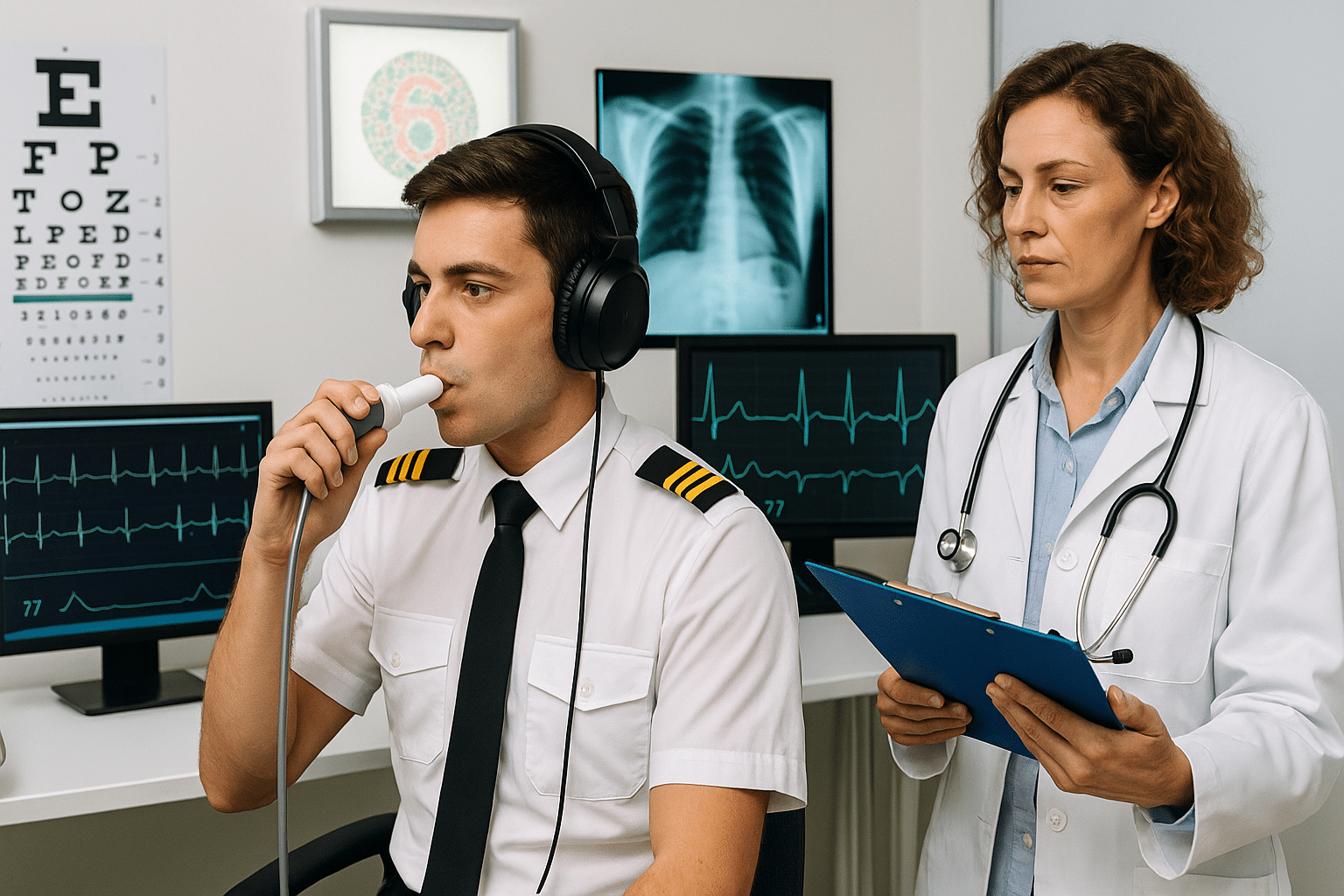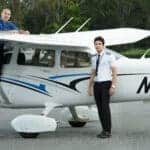DGCA Class 1 Medical Requirements: 2025 Ultimate Checklist

Why the DGCA Class 1 Medical Requirements Matter for Your Pilot Career
In Indian aviation, your journey to becoming a professional pilot doesn’t start with a cockpit—it starts with your medical fitness. The DGCA Class 1 Medical Requirements are not just a formality; they are the first real gate you must pass through to earn your Commercial Pilot License (CPL) or Airline Transport Pilot License (ATPL).
The Directorate General of Civil Aviation (DGCA) sets strict medical standards because pilots are trusted with lives, complex machines, and fast-moving decisions. If you can’t meet those standards, no amount of flying hours or exam scores will get you licensed. That’s why preparing early for your Class 1 Medical is absolutely critical.
This 2025 Checklist will walk you through everything you need to know: the exact fitness requirements, the tests involved, how to book your exam, what common pitfalls to avoid, and smart tips to ensure you pass without unnecessary delays.
Your wings depend on your health. Let’s break down what it takes to clear the DGCA Class 1 Medical in 2025—and set your pilot career in motion.
What is the DGCA Class 1 Medical Examination?
Before you ever command an aircraft as a licensed pilot in India, you must first prove that your body and mind can handle the demanding, high-responsibility environment of aviation. That’s where the DGCA Class 1 Medical Examination comes in.
The Directorate General of Civil Aviation (DGCA) is the regulatory authority that oversees aviation safety standards in India, and one of its most important roles is certifying pilots’ medical fitness. Class 1 Medical Certification is mandatory for anyone pursuing a Commercial Pilot License (CPL), aiming for airline recruitment, or upgrading to an Airline Transport Pilot License (ATPL).
Without an active, valid Class 1 Medical Certificate, even the most skilled pilot is legally grounded. The DGCA treats pilot health as a non-negotiable priority because any lapse in physical, mental, or sensory function at 30,000 feet could have catastrophic consequences.
Many students first encounter medical requirements through the Class 2 Medical Examination, which allows them to begin basic flight training. However, the Class 1 Medical is a much deeper, more rigorous assessment. While Class 2 focuses on general fitness for student pilots, Class 1 delves into cardiovascular health, advanced neurological evaluations, and psychological stability—all of which must meet airline-level standards.
Passing the DGCA Class 1 Medical Examination isn’t just another box to tick—it’s your first real qualification as a future professional aviator.
Complete DGCA Class 1 Medical Requirements: 2025 Ultimate Checklist
The DGCA Class 1 Medical Requirements are detailed, and for good reason: a pilot’s physical and mental condition must be impeccable. The examination covers multiple systems in your body, and any significant deviation from the standards could delay or disqualify your licensing process.
Here’s what you can expect during your Class 1 Medical evaluation in 2025:
Vision and Eyesight Standards: Your vision must be near perfect, whether naturally or corrected. Distance vision must be 6/6 in each eye, with or without corrective lenses. You’ll undergo color vision tests (Ishihara plates or equivalent) because pilots must accurately interpret cockpit instruments, runway lights, and navigation signals. Depth perception and field of vision are also checked thoroughly.

Hearing and Audiometry Requirements: Clear, accurate hearing is essential for interpreting radio communications with air traffic control. Candidates must pass an audiometry test, demonstrating the ability to hear a normal conversational voice at a distance of 2 meters and detect tones across specific frequency ranges.
Cardiovascular Fitness (ECG Tests): An electrocardiogram (ECG) will be performed to evaluate heart health. The test screens for arrhythmias, abnormal heart rhythms, and any signs of cardiovascular disease. Pilots must show that their hearts can sustain high workload environments without failure.
Pulmonary/Lung Function (Spirometry): A spirometry test measures lung capacity and breathing strength. Healthy lungs are critical, not only for normal respiration but also for handling rapid changes in cabin pressure and oxygen availability during flight.
Neurological Assessments: Neurological fitness involves checking reflexes, muscle strength, coordination, and balance. The DGCA medical exam ensures there are no underlying conditions like epilepsy, seizure history, or movement disorders that could interfere with safe aircraft operation.

Psychological and Psychiatric Screening: Mental resilience is non-negotiable in aviation. Candidates are assessed for psychological stability, stress tolerance, and emotional regulation. This may include structured interviews, questionnaires, and, in some cases, psychiatric evaluations if any red flags are noted.
Blood Tests and Urine Analysis: Routine blood tests check for diabetes, anemia, infections, liver and kidney function, and other general health markers. Urine analysis detects early signs of systemic diseases and drug usage, ensuring the pilot is free from any condition that could affect alertness or stamina.
Chest X-Rays and Overall Physical Examination: A chest X-ray checks for hidden lung or heart abnormalities, including tuberculosis—a critical concern in India. Additionally, a full-body physical exam covers skeletal health, abdominal examination, and an overall check for any physical deformities that could impede pilot duties.
The DGCA Class 1 Medical isn’t designed to intimidate you—it’s designed to protect you, your passengers, and your career. Passing it is your proof that you are ready for the extraordinary demands of professional aviation.
DGCA Class 1 Medical Requirements: Approved Medical Centers and Examiners
One of the most important steps in completing your DGCA Class 1 Medical Examination is making sure you book it through an officially approved center. The DGCA has strict requirements around where and by whom your medical tests can be conducted, and failure to follow this can render your medical certificate invalid—costing you both time and money.
In India, DGCA-approved Class 1 medicals can only be performed at designated aviation medical centers or hospitals authorized by the DGCA Medical Directorate. These include Air Force medical establishments like the Institute of Aerospace Medicine (IAM), Bengaluru, as well as select civil hospitals in major cities like Delhi, Mumbai, Hyderabad, and Kolkata.
In addition to the medical center, you must ensure that the tests are conducted by a DGCA-authorized Class 1 Medical Examiner (AME). Only AMEs listed on the DGCA’s official portal are permitted to issue Class 1 medical assessments. Examiners who are not on this list may offer similar tests, but DGCA will not accept the results for licensing purposes.
To find a current, verified list of AMEs:
- Visit the DGCA Medical Directorate page
- Navigate to the “Medical” section
- Search by examiner name, city, or medical center
Choosing a recognized center ensures that all testing protocols meet aviation standards. It also protects you from inconsistencies, outdated procedures, and rejected reports. When your future as a pilot is on the line, don’t risk cutting corners—book your Class 1 Medical through a certified route from the start.
Step-by-Step Process to Book and Complete Your DGCA Class 1 Medical
Booking your DGCA Class 1 Medical isn’t something you do casually—it requires advanced planning, document readiness, and a full understanding of what to expect during the process.
The first step is registering on the eGCA portal, where all DGCA-related pilot services are now processed digitally. You’ll need to create a personal profile, upload basic information, and select a preferred medical center and date. Appointments must often be booked weeks or even months in advance, especially at high-traffic centers like IAM Bengaluru.
Before your appointment date, ensure you have the following:
- A valid passport or government-issued ID
- Recent passport-size photographs
- Copies of your previous Class 2 Medical Certificate (if applicable)
- Any medical records related to past surgeries, hospitalizations, or chronic conditions
The examination itself typically spans one to two full days. It starts with general check-ups and lab tests, followed by vision, hearing, ECG, X-rays, spirometry, and neurological screenings. Some centers conduct psychological assessments and interviews to assess emotional and cognitive stability, especially for CPL or airline applicants.
Once all tests are complete, the medical examiner will review your results. If you pass all assessments, your DGCA Class 1 Medical Certificate is issued and uploaded digitally via the eGCA portal, usually within a few days. If any issues are flagged, the examiner may request additional tests, issue a temporary unfit notice, or guide you through a correction and re-evaluation process.
Pro tip: Schedule your Class 1 Medical before you reach the final stages of your ground or flight training. This ensures that you catch any red flags early—and avoid career delays due to preventable disqualifications.
DGCA Class 1 Medical Requirements: Common Reasons Candidates Fail
Even strong candidates sometimes stumble at the final hurdle—the DGCA Class 1 Medical Requirements are strict, and small oversights can lead to unexpected disqualifications. Understanding the most common reasons for failure gives you a huge advantage when preparing for your medical examination.
One of the top causes is uncorrected vision issues. Even minor discrepancies in distance vision, depth perception, or color vision can raise flags during your Class 1 assessment. While corrective lenses are allowed under the DGCA Class 1 Medical Requirements, all vision standards must be met precisely on test day.
High blood pressure and cardiovascular anomalies are another frequent problem. A poorly managed lifestyle, stress, or undiagnosed heart conditions can show up in your ECG results, leading to temporary or even permanent medical ineligibility.
Undiagnosed respiratory or neurological issues also cause candidates to fail. Many candidates are unaware of early-stage asthma, chronic respiratory limitations, or hidden neurological conditions like mild seizure history—all of which can surface during lung function and neurological tests.
Finally, mental health plays a critical but sometimes overlooked role. Under the DGCA Class 1 Medical Requirements, emotional stability and stress management are essential traits for pilots. Candidates who show signs of clinical anxiety, depression, or impaired cognitive function during psychological screenings may be asked to undergo further evaluations before being cleared.
The DGCA’s standards are designed not to disqualify you—but to ensure that every pilot in Indian airspace can safely handle the high-stress, high-responsibility environment that aviation demands. Knowing these common pitfalls now gives you time to prepare, correct minor issues, and show up ready to succeed.
How to Prepare for Your DGCA Class 1 Medical
Passing the DGCA Class 1 Medical Requirements isn’t just about showing up—it’s about arriving prepared, both physically and mentally. Small, smart steps taken weeks before your exam can make a major difference in your results and certification timeline.
Start with your overall health and fitness. Maintain a regular exercise routine focused on cardiovascular strength and flexibility. Healthy pilots generally have lower resting heart rates, better lung function, and higher physical endurance—all key benchmarks under the DGCA Class 1 Medical Requirements.
Diet, hydration, and sleep are equally critical. Focus on a balanced diet rich in fruits, vegetables, lean proteins, and hydration through water, not sugary or caffeinated drinks. In the week leading up to your medical exam, avoid processed foods, excessive salt, and alcohol. Consistent sleep schedules help regulate your blood pressure and cognitive sharpness, which can subtly but significantly affect test outcomes.
Pay attention to mental wellness as well. Pilots are expected to manage stress and demonstrate emotional resilience. Regular mindfulness practices, light meditation, or even structured breathing exercises can strengthen your mental fitness—an important, though less visible, part of clearing the DGCA Class 1 Medical Requirements.
If you are aware of minor correctable issues, such as needing updated glasses prescriptions, slightly elevated blood pressure, or past medical records that require explanation, address them early. Proactive correction shows maturity and increases examiner confidence in your fitness for professional flying.
The bottom line is simple: Good preparation isn’t just physical—it’s a mindset. Taking charge of your health now ensures that your DGCA Class 1 Medical will be a milestone, not a stumbling block, on your journey to becoming a licensed pilot.
Conclusion: Passing Your DGCA Class 1 Medical is Step 1 Toward Becoming a Professional Pilot
Mastering the DGCA Class 1 Medical Requirements is not just a task on your to-do list—it’s the foundation that determines whether you’re truly ready to step into the demanding world of professional aviation. Without a valid Class 1 Medical Certificate, you cannot move forward with your Commercial Pilot License (CPL) training or airline career ambitions.
Preparation is everything. Understanding the DGCA Class 1 Medical Requirements in advance, addressing potential issues early, and taking control of your health and fitness dramatically increase your chances of passing smoothly. It’s not enough to just hope for good results—you must actively prepare for them.
The pilots who succeed are the ones who start early, stay proactive, and take every aspect of the DGCA Class 1 Medical Requirements seriously. Your health, your discipline, and your mindset today will shape the wings you’ll earn tomorrow.
Start strong. Stay focused. And set your pilot journey in motion by mastering the DGCA Class 1 Medical Requirements in 2025.
FAQ – DGCA Class 1 Medical Requirements
| Question | Answer |
|---|---|
| Who needs a DGCA Class 1 Medical Certificate? | Anyone pursuing a Commercial Pilot License (CPL), Airline Transport Pilot License (ATPL), or seeking employment with airlines in India must meet the DGCA Class 1 Medical Requirements. |
| How long is the DGCA Class 1 Medical Certificate valid? | The DGCA Class 1 Medical Certificate is typically valid for 1 year. Renewal is required annually to maintain pilot licensing eligibility under the DGCA Class 1 Medical Requirements. |
| Can minor vision issues be corrected for passing? | Yes, corrective lenses are allowed, provided the vision correction enables candidates to meet the full DGCA Class 1 Medical Requirements for distance vision, depth perception, and color recognition. |
| What happens if you fail the Class 1 Medical? | Candidates who fail the DGCA Class 1 Medical Requirements may be given time to correct specific issues and reapply. In some cases, appeals and second evaluations are possible through the DGCA Medical Directorate. |
| Where can I find DGCA-approved medical examiners? | A complete list of DGCA-approved medical examiners (AMEs) is available on the DGCA India official website under the Medical Directorate section. Candidates must select examiners authorized to conduct assessments according to DGCA Class 1 Medical Requirements. |
Contact the Florida Flyers Flight Academy Team today at 91 (0) 1171 816622 to learn more about the Private Pilot Ground School Course.



Table of Contents






